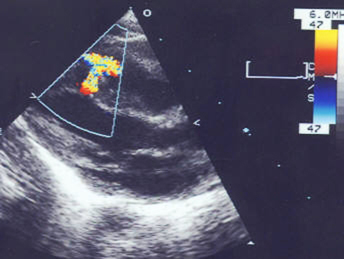Summary
Definition
History and exam
Key diagnostic factors
- systolic murmur left parasternal region
- faltering growth
- shortness of breath
Other diagnostic factors
- recurrent pulmonary infections
- loud pulmonary component of the second heart sound
- cyanosis
- finger clubbing
- recent myocardial infarction (usually within 3 to 5 days)
- recent trauma
Risk factors
- family history of congenital heart disease
- Down syndrome (trisomy 21)
- maternal alcohol consumption during pregnancy
- maternal cigarette smoking during pregnancy
Diagnostic tests
1st tests to order
- echocardiography
- chest x-ray
- ECG
Tests to consider
- cardiac MRI
- cardiac CT scan
- cardiac catheterization
Treatment algorithm
congenital: small
congenital: medium or large
acquired
Contributors
Authors
Kul Aggarwal, MD, MRCP, FACC

Professor of Clinical Medicine
University of Missouri
Columbia
MO
Disclosures
KA declares that he has no competing interests.
Acknowledgements
Dr Kul Aggarwal would like to gratefully acknowledge Professor Zuhdi Lababidi, a previous contributor to this topic.
Disclosures
ZL declares that he has no competing interests.
Peer reviewers
Michael Cheung, BSc (Hons), MB ChB, MRCP, FRACP
Acting Head
Department of Cardiology
Royal Children's Hospital
Melbourne
Australia
Disclosures
MC declares that he has no competing interests.
Sachin Khambadkone, MD, DCH, DNB
Consultant Paediatric Cardiologist and Honorary Senior Lecturer
Great Ormond Street Hospital and Institute of Child Health
London
UK
Disclosures
SK declares that he has no competing interests.
Tain-Yen Hsia, MD
Attending Pediatric Cardiothoracic Surgeon
Medical University of South Carolina Children's Hospital
Charleston
SC
Disclosures
TYH declares that he has no competing interests.
Peer reviewer acknowledgements
BMJ Best Practice topics are updated on a rolling basis in line with developments in evidence and guidance. The peer reviewers listed here have reviewed the content at least once during the history of the topic.
Disclosures
Peer reviewer affiliations and disclosures pertain to the time of the review.
References
Key articles
Stout KS, Daniels CJ, Aboulhosn JA, et al. 2018 AHA/ACC guideline for the management of adults with congenital heart disease: a report of the American College of Cardiology/American Heart Association Task Force on Clinical Practice Guidelines. Circulation. 2019 Apr 2;139(14):e698-800.Full text Abstract
Baumgartner H, De Backer J, Babu-Narayan SV, et al. 2020 ESC guidelines for the management of adult congenital heart disease. Eur Heart J. 2021 Feb 11;42(6):563-645.Full text Abstract
Expert Panels on Cardiac Imaging and Pediatric Imaging; Krishnamurthy R, Suman G, Chan SS, et al. ACR appropriateness criteria® congenital or acquired heart disease. J Am Coll Radiol. 2023 Nov;20(11s):S351-81.Full text Abstract
John AS, Jackson JL, Moons P, et al. Advances in managing transition to adulthood for adolescents with congenital heart disease: a practical approach to transition program design: a scientific statement from the American Heart Association. J Am Heart Assoc. 2022 Apr 5;11(7):e025278.Full text Abstract
Reference articles
A full list of sources referenced in this topic is available to users with access to all of BMJ Best Practice.

Differentials
- Atrial septal defect
- Patent ductus arteriosus
- Mitral regurgitation
More DifferentialsGuidelines
- ACR appropriateness criteria: congenital or acquired heart disease
- Advances in managing transition to adulthood for adolescents with congenital heart disease
More GuidelinesLog in or subscribe to access all of BMJ Best Practice
Use of this content is subject to our disclaimer